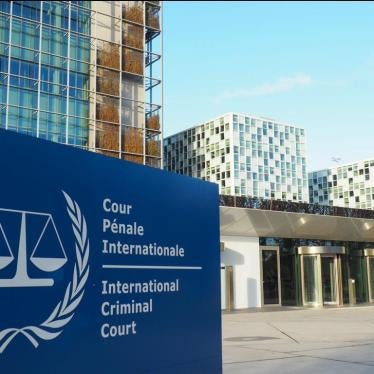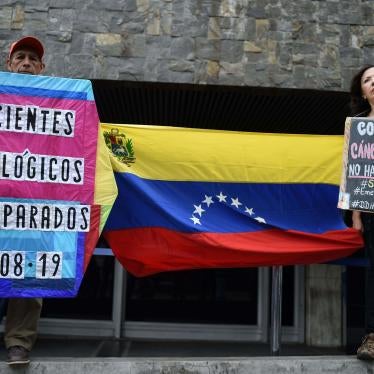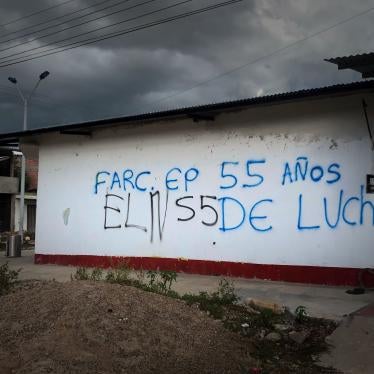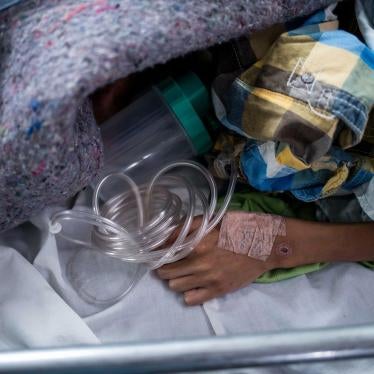For the first time in 15 years, international monitors will be deployed in Venezuela to observe the regional and local elections scheduled for November 21.
The Maduro government’s crackdown on dissent means these elections will be neither free nor fair, which has led some to fear that granting monitors access is a strategy to try to legitimize a sham.
But monitors could play a crucial role - if they are able to effectively use the broad access that electoral authorities agreed to, questioning in a timely fashion the reality on the ground and documenting rights violations.
The contours of state control in Venezuela
The repression has fostered an atmosphere of intimidation. For years, elections in Venezuela have been plagued with irregularities, allegations of fraud, and an uneven playing field due to human rights violations.
The authorities have disqualified, detained, and arbitrarily prosecuted political opponents; carried out political takeovers of opposition parties; and used hunger as a tool for controlling potential voters.
The Supreme Court, which lacks independence, has interfered with the leadership or internal structure of eight opposition political parties since 2012.
In mid-2020, it orchestrated the takeover of three opposition parties and appointed government supporters to lead them, allowing them to use the parties’ names and logos.
It also appointed government supporters to the National Electoral Council (CNE), despite constitutional provisions establishing that the National Assembly - then the only opposition-led institution that acted as a check on executive power - should make the selection.
Last December, Maduro supporters gained control of the National Assembly in widely-criticized elections that most opposition parties boycotted, and in which fewer than one-third of registered voters participated.
Many governments both in the region and in Europe said the elections had not met the minimum requirements to be considered free and fair.
In February, the Comptroller's Office disqualified 27 opposition politicians, members of the opposition-led National Assembly, who had planned to run in the elections.
After increased international pressure, a new National Electoral Council took office in May with two out of five members linked to the opposition.
The new council negotiated the deployment of a European Union electoral observation mission, a small United Nations panel of electoral experts, and a Carter Center expert mission to monitor the November vote.
Who are the experts monitoring Sunday's vote?
The European Union deployed its observation mission in Venezuela in October; additional observers will join them this weekend. Since their arrival, they have been meeting with key actors to assess the situation.
The agreement signed by the EU and Venezuela’s Electoral Council grants observers full access to political parties, candidates, electoral authorities, and other actors, as well as polling stations.
The mission can publicly share its assessment of the electoral process both before and during the elections.
It will then present a preliminary report right after the election, and a longer one between two and three months later with recommendations. If the agreement’s conditions are not fulfilled, the EU may withdraw its observers.
A group of 12 European Parliament members from various political parties is also scheduled to accompany the mission.
The United Nations secretariat announced on October 14 that it would deploy a UN Panel of Electoral Experts for the November elections.
These three experts will “follow the electoral process” and present to the secretary-general an “independent internal report of the overall conduct of the elections”.
On October 27, the Carter Center announced it would deploy six further experts based on an agreement with the Electoral Council that granted them “sufficient access to the process to conduct [their] work".
They will assess aspects such as the campaign environment, media freedom, disinformation and misinformation trends; and the respect of basic rights in the country.
The new electoral Council also announced that some opposition political parties would be able to participate in the November elections. Key opposition parties confirmed their participation as the Unitary Platform.
Observing elections could help expose deep issues in Venezuela
For all Venezuelans to be able to exercise their right to vote and run for office, it is essential to allow open debate in an atmosphere free from fear, violence, and intimidation by government officials, security forces, and armed pro-government groups.
All political parties should be allowed to freely select the leadership of their choice without undue government or judicial interference. The opposition should be able to freely share its views in the media, social media, and on the streets.
Arbitrary charges against opposition politicians should be dropped, those in arbitrary detention released, and those arbitrarily disqualified from running for office should have the right to do so.
The government and its supporters should not politically discriminate against opponents and critics, including by limiting their access to subsidized food and public services.
The government should also ensure that all Venezuelans are able to effectively vote: a particular concern for low-income Venezuelans, who due to fuel shortages have limited access to public transport to polling stations.
The independent media and civil society should be able to report on the process and conditions without reprisal, and an independent judiciary should impartially resolve complaints, and deter electoral fraud, intimidation, and other abuses.
None of these conditions are met in Venezuela today. The presence of monitors with a broad mandate and access, who have experience in dealing with repressive governments, has the potential to help objectively highlight these deep problems as they occur.
Monitors could also help lay the groundwork for ensuring conditions that would enable Venezuelans to exercise their rights in future elections. All those involved should seize this opportunity by supporting the monitors to fully exercise their mandates.








